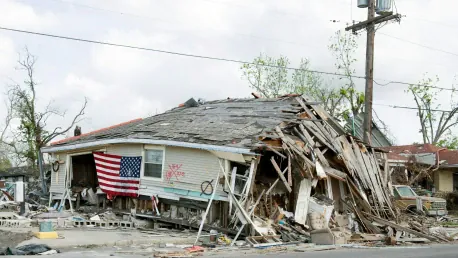As meteorologists predict an unusually active Atlantic hurricane season, with 17 named storms, nine hurricanes, and four major hurricanes anticipated, it becomes imperative for homeowners and business owners to ensure they are adequately prepared. This forecast, based on research by Colorado State University (CSU) and senior research scientist Phil Klotzbach, highlights the significant impact of warmer-than-normal Atlantic waters and the likelihood of neutral or weak La Niña conditions. Recognizing the imminent threat, experts emphasize the importance of reviewing insurance policies to guarantee protection against potential storm damage.
The Importance of Insurance Preparation
In light of the increased hurricane activity forecast, Sean Kevelighan, CEO of the Insurance Information Institute (Triple-I), advises homeowners and business owners to revisit their insurance policies. This precautionary step is vital in securing the appropriate types and amounts of coverage needed for financial protection. Given that an average Atlantic hurricane season typically includes 14 named storms, seven hurricanes, and three major hurricanes, the 2025 season’s forecast is indeed a cause for concern.
Understanding the previous year’s data can provide perspective on what to expect. The 2024 hurricane season saw 18 named storms and 11 hurricanes, five of which reached major hurricane status. Significant landfalls, such as Hurricanes Debby, Helene, and Milton, caused extensive damage, particularly with Helene’s Category 4 strength impacting multiple southeastern states. This serves as a stark reminder of the potential destruction that can occur and underscores the necessity for proper insurance coverage.
Securing and Improving Property
To mitigate the risks associated with hurricanes, it is essential to have adequate wind and flood insurance. Notably, flood coverage is typically not included in standard homeowners or business policies, making it a critical addition. Furthermore, implementing physical improvements such as installing roof tie-downs, storm shutters, and wind-rated garage doors can enhance the resilience of properties against storm damage.
Alongside these measures, the CSU provides updated landfall probabilities, estimating a 51% chance for the U.S. coastline, 26% for the U.S. East Coast, 33% for the Gulf Coast, and 56% for the Caribbean. These probabilities highlight the areas at greatest risk and stress the importance of taking comprehensive steps to protect property and financial assets.
Preparation Beyond Insurance
Beyond insurance policies and property improvements, early preparation in hurricane-prone areas includes developing emergency plans, documenting property, and assembling disaster supply kits. Residents are encouraged to create detailed emergency plans that outline evacuation routes, essential contacts, and immediate steps to take in the event of a hurricane. Keeping an inventory of personal and business property, complete with photographs and descriptions, can facilitate smoother insurance claims if damage occurs.
Furthermore, assembling disaster supply kits containing necessities such as first aid supplies, non-perishable food, water, and important documents ensures readiness in an emergency. Combining these proactive strategies with comprehensive insurance reviews will significantly bolster financial security against the severe weather predicted for the 2025 hurricane season.
Conclusion: Taking Action Now
Meteorologists are forecasting an unusually active Atlantic hurricane season, predicting 17 named storms, nine hurricanes, and four major hurricanes. This projection, derived from research by Colorado State University (CSU) and senior research scientist Phil Klotzbach, underscores the significant impact of warmer-than-normal Atlantic waters and the likelihood of neutral or weak La Niña conditions. Given this heightened risk, it is critical for homeowners and business owners to ensure they are fully prepared. Experts strongly advise reviewing and updating insurance policies to guarantee adequate protection against potential storm-related damages. By taking these precautions, individuals can better safeguard their properties and finances from the destructive forces of nature. As the threat of severe weather looms, proactive measures can provide peace of mind and potentially save significant expenses in the aftermath. Don’t wait—prepare now to mitigate the dangers associated with the impending hurricane season.









